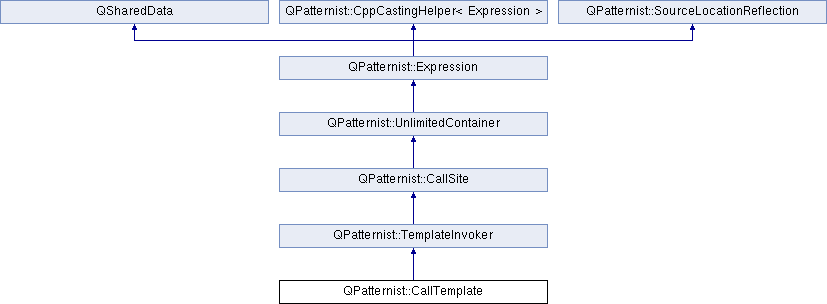 |
Qt 4.8
|
 |
Qt 4.8
|
Implements xsl:call-template.
More...
#include <qcalltemplate_p.h>

Properties | |
| Template::Ptr | m_template |
Definition at line 74 of file qcalltemplate_p.h.
| CallTemplate::CallTemplate | ( | const QXmlName & | name, |
| const WithParam::Hash & | withParams | ||
| ) |
Definition at line 50 of file qcalltemplate.cpp.
|
virtual |
Implements QPatternist::Expression.
Definition at line 132 of file qcalltemplate.cpp.
|
virtual |
Returns the body of the function/template/component that is being called.
Implements QPatternist::CallSite.
Definition at line 143 of file qcalltemplate.cpp.
Referenced by setTemplate().
|
virtual |
Implements QPatternist::CallSite.
Definition at line 148 of file qcalltemplate.cpp.
Referenced by setTemplate().
|
virtual |
Called in the earliest stages of the compilation process. sign can be any function signature for a user declared function. If sign matches this UserFunctionCallsite, it means the UserFunction represented by sign is recursive and that this UserFunctionCallsite should take appropriate measures.
true if is recursive, otherwise false Implements QPatternist::CallSite.
Definition at line 137 of file qcalltemplate.cpp.
Referenced by setTemplate().
|
virtual |
Recursively computes through all descendants until a Property is encount
Reimplemented from QPatternist::Expression.
Definition at line 119 of file qcalltemplate.cpp.
|
virtual |
Determines the Effective Boolean Value of the expression.
The Effective Boolean Value of a value is not necessarily the same as converting the value to a new value of type xs:boolean.
Note that this function cannot return the empty sequence, evaluateSingleton() must be overridden in order to be able to do that.
The default implementation results in a type error. Hence, this function must be overridden if such behavior is not of interest.
Reimplemented from QPatternist::Expression.
Definition at line 61 of file qcalltemplate.cpp.
|
virtual |
Evaluate this Expression by iterating over it. This is a central function for evaluating expressions.
Expressions must always always return a valid QAbstractXmlForwardIterator and may never return 0. If an empty result is of interest to be returned, the EmptyIterator should be returned.
The default implementation returns a SingletonIterator over the item returned from evaluateSingleton().
Reimplemented from QPatternist::Expression.
Definition at line 55 of file qcalltemplate.cpp.
|
virtual |
Evaluates this Expression by sending its output to DynamicContext::outputReceiver().
Reimplemented from QPatternist::Expression.
Definition at line 67 of file qcalltemplate.cpp.
|
virtual |
The default implementation returns 0. Override and let the function return a different value, if that's of interest.
An important decision when re-implementing properties() is whether to OR in the properties() of ones operands. For instance, if an operand has RequiresFocus set, that flag nost likely applies to the apparent as well, since it depends on its operand.
Reimplemented from QPatternist::Expression.
Definition at line 105 of file qcalltemplate.cpp.
|
inline |
Definition at line 101 of file qcalltemplate_p.h.
Referenced by QPatternist::ExpressionFactory::createExpression().
|
virtual |
Implements QPatternist::Expression.
Definition at line 127 of file qcalltemplate.cpp.
|
virtual |
This is a bit complicated by that we have two required types, one specified by xsl:param in the template declaration, and one on xsl:with-param.
Reimplemented from QPatternist::Expression.
Definition at line 73 of file qcalltemplate.cpp.
|
private |
Definition at line 110 of file qcalltemplate_p.h.
Referenced by body(), dependencies(), evaluateEBV(), evaluateSequence(), evaluateToSequenceReceiver(), properties(), setTemplate(), and typeCheck().